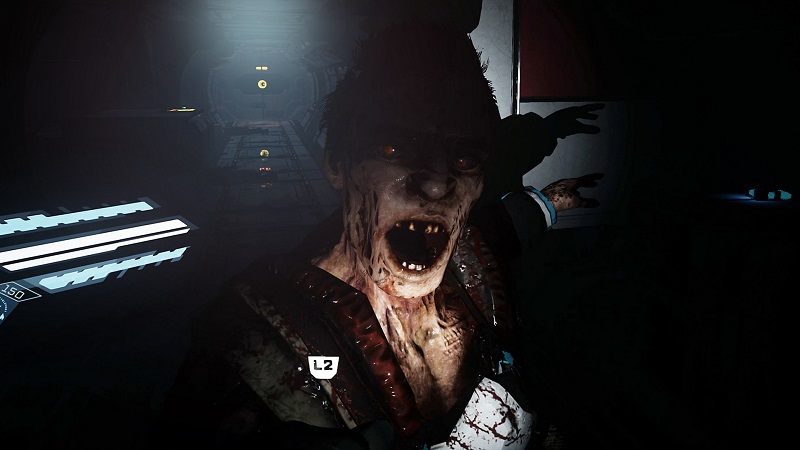The Persistence is a stealth action survival horror first-person shooter available from retail stores and for download from the PlayStation Store for PlayStation VR. The Persistence VR’s development team at Firesprite is well known amongst PlayStation gamers as part of Studio Liverpool that developed such iconic franchises as Destruction Derby, F1 and Wipeout, alongside fan favourites including the Colony Wars trilogy and G-Police 1 and 2 with so many more classic games from their days as Psygnosis. When Firesprite was formed in 2012; the development team continued their long-time collaboration with PlayStation by developing The Playroom as a PS4 launch title followed by Run Sackboy! Run! on Vita and mobile devices in 2014 and PlayStation VR launch title The Playroom VR, while continuing their VR focus by taking the unexpected step of creating a game within the horror genre. Can Firesprite deliver the most atmospheric virtual reality horror gameplay to date on any VR platform with PlayStation VR exclusive The Persistence?
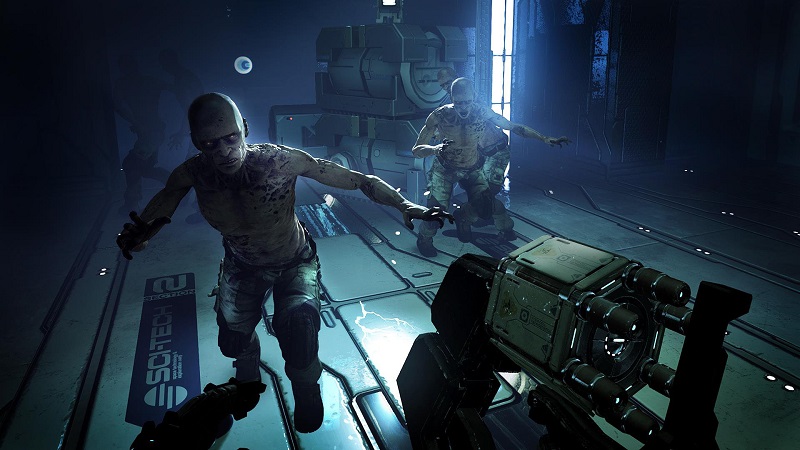
The story revolves around something going disastrously wrong within a spaceship named The Persistence as it is situated in the far reaches of outer space. The Persistence’s only chance is for the onboard artificial intelligence to effectively 3D print a human body with the mind and memories of one of the ship’s former crew members to be able to find a path beyond anything that is in her way to guide the ship back on course and save the day in the process.
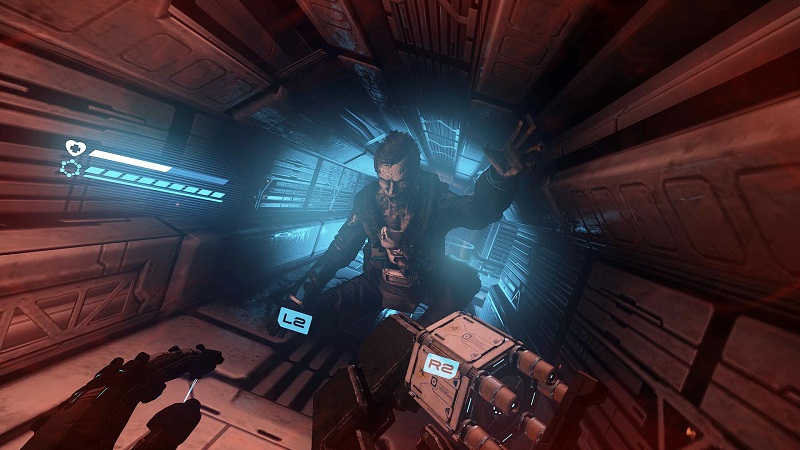
Campaign mode essentially tells the story of The Persistence; campaign mode gameplay begins with a tutorial that allows the player to calibrate and adapt to their preferred movement speed. However, completing the campaign is not the end of the story as it leads back around to campaign+ mode in which the player retains all of their gear and upgrades from the previous playthrough, but to directly counteract that; there is a new hardcore difficulty mode that really increases the tension. Gameplay rules are adjusted as the player no longer has super sense and a Bloodhound pursues the player from the start of campaign+. Meanwhile, there are new character upgrade levels and platinum rarity gear items to give the player a chance of not only fighting the onslaught of campaign+, but also surviving it. Survival mode tasks the player to complete the story with a maximum of 10 clones and is unlocked by completing campaign mode. Permadeath mode is unlocked by completing any campaign with 10 or fewer clones. Permadeath mode provides the playable character with only one life and upon being defeated; the player must return to the start of the game. The player still has the capability of upgrading their character as the deck porters allows travel between all decks and recovery to quickly upgrade and purchase gear in order to balance your character’s chances of survival.
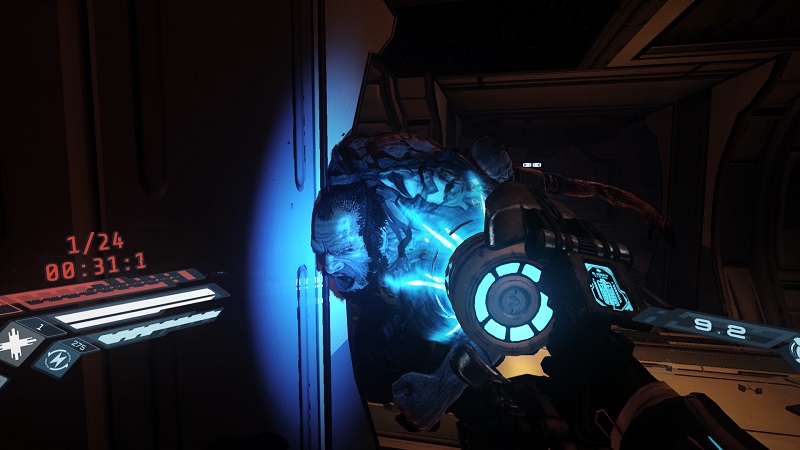
Challenge mode introduces game changing gameplay including the Glass Cannon challenge that tasks the player in making their way through 24 increasingly difficult rooms before reaching an escape pod at the far end of the deck. The player select a gun at the start of each attempt that is equipped with infinite ammo; however in the biggest challenging gameplay element the player only has 1 hit point and there are no health pickups. If that was not hard enough, every time the player enters a room; the doors slam shut and enemies begin their onslaught specifically on your character, despite Glass Cannon being a race against the clock to reach the escape pod as quickly as possible. Meanwhile, there is also the First Blood challenge involving the player stealthily progressing through another deck in an attempt to reach the escape pod, while only being equipped with a knife to perform melee attacks on enemies.
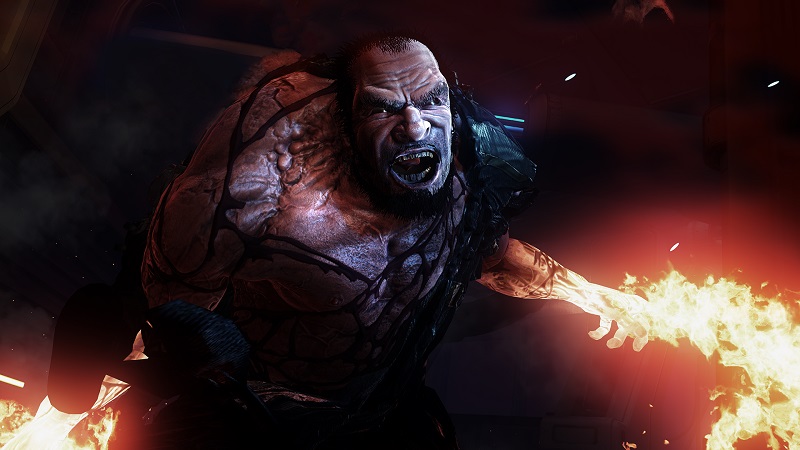
Enemy design is as good as can be anticipated from a story set within the survival horror genre. Enemies come in all different shapes and sizes with their own ways of attacking your character; therefore enemies will gradually become harder to defeat, although your weaponry and abilities will be improved ever so often to balance out the gameplay.

Weaponry is diverse and unique in design with your character’s signature weapon referred to as the harvester that is found and equipped very early on in campaign mode; particularly looking totally different from anything else with a design ethos similar to that of Insomniac Games’ classic sci-fi FPS Disruptor. The harvester shoots out barbs that are reminiscent to that of a taser as it latches onto enemies, removing a large quantity of their best stem cells in the process. Elsewhere, your shield has a short duration, so has to be utilised strategically and timed accordingly to prevent enemies inflicting damage to your character, while teleportation as standard requires a momentary recharge for a few seconds after each usage. Weapon and ability upgrades can be purchased from the gear store and DNA sequencer respectively in the recovery room after your character has been defeated by an enemy. The gear store utilises Erebus tokens that are situated throughout the ship and can be collected that work in perfect harmony with the in-game currency of fab chips to be exchanged for weapon upgrades. For instance, the fab chips allows the player to purchase upgrades within the gear store for weapon power, increasing loot value, increasing armour efficiency, reducing the amount of time required for dark matter regeneration, gaining HP when at maximum health and increasing your speed when stealthily sneaking up behind an enemy. In other categories of the gear store; you can also upgrade your harvester weapon and such abilities as your teleportation range, force field shield and super sense capabilities. Stem cells is a further form of in-game currency that improve your character’s abilities in which players can upgrade their character’s health, dark matter related abilities including teleportation and super sense, stealth effectiveness and the quantity of melee damage inflicted upon enemies at a cost of anywhere from 500 stem cells up to thousands of stem cells for a single upgrade.
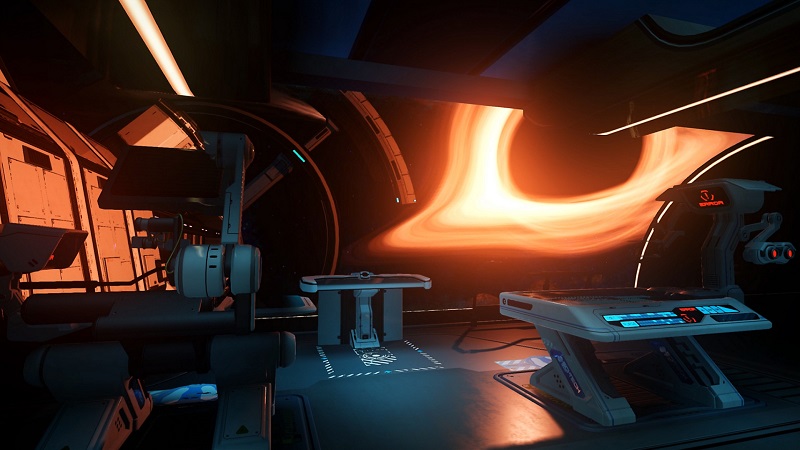
Environment design is as varied as the enemy design and weaponry as it is procedurally generated with the procedural generation occurring after your character has been defeated by an enemy, then having to be put into another clone. Procedurally generated environments are actually explained within the dialogue between your character and The Persistence’s onboard artificial intelligence; as a consequence of the black hole situated nearby the spaceship. Environments can be open and spacious one moment to give the player a false sense of reassurance followed by a vent that your character has to crawl along the ground to move through or a narrow hallway or room that is claustrophobic, especially when enemies can be heard very close to your current position.
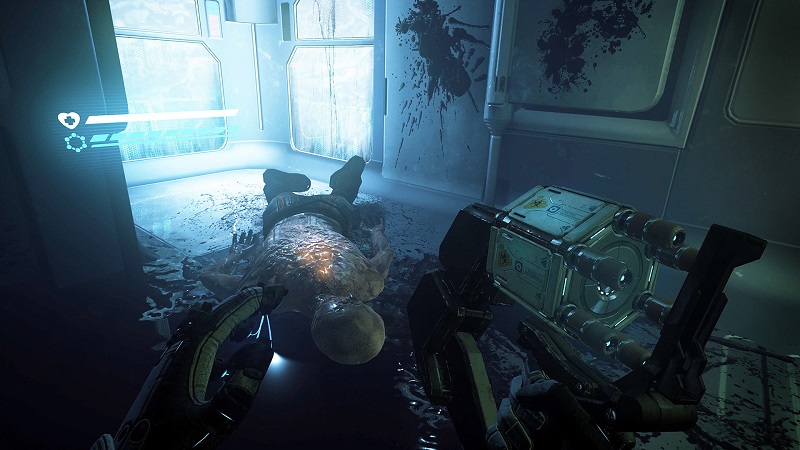
The Persistence’s movement is quite important, therefore Firesprite have incorporated three pre-set movement calibrations including snap that allows for maximum comfort specifically for anyone with concerns of VR sickness via a mixture of free movement and 22.5, 45 or 90 degree incremental angles; comfort provides very fast movement yet reduces the potential of VR sickness and standard offers smooth movement with acceleration that is particularly for anyone that would consider themselves an experienced VR gamer, while each movement calibration is also complimented by a teleporter, albeit one that cannot be used frequently due to having to be recharged for a few seconds after use unless customising gameplay even further through assist mode that contains an infinite teleportation option. However, there are numerous customisable settings to adapt movement to being as comfortable for each individual player’s preferences including snap rotate, snap angle, rotation speed, rotation acceleration, turn 180 degrees, smooth teleport dash, vignette turn, vignette move, vignette strength, vignette fall, vibration, damage shake and arms set within camera positioning.
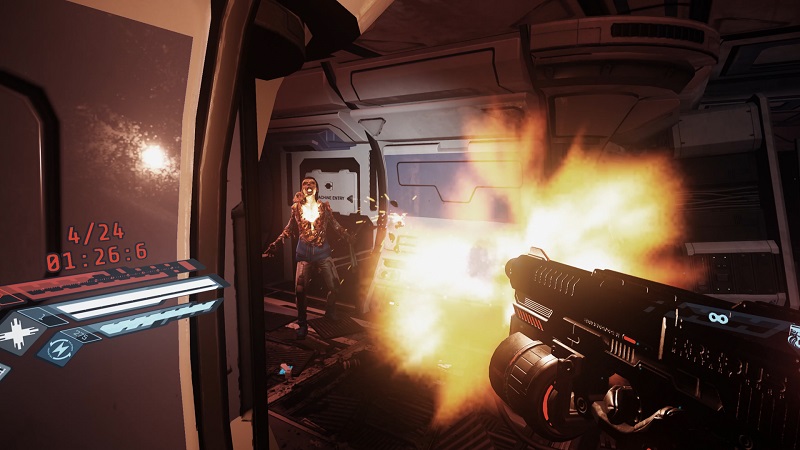
The control scheme is appropriately mapped to the DualShock 4 controller comprising of pressing R2 to perform an attack or melee on an enemy; pressing L2 to defend your character from an enemy; pressing R1 to display your inventory pressing L1 to display current objectives; pressing X to teleport; pressing O to perform a quick interaction; pressing triangle to utilise your character’s super sense ability; pressing square to perform a stealth takedown on an enemy; pressing left on the d-pad to select a weapon; pressing right on the d-pad to torch; changing the direction of the left analogue stick to move your character; changing the direction of the right analogue stick to rotate your character or pulling back on the right analogue stick to turn 180 degrees; pressing R3 to crouch; tapping the touch pad to display a map of your surroundings; pressing the share button takes you to the share feature menu; and pressing the options button to display the pause menu. Vibration occurs when using a weapon in combat or when having been hit by an enemy and as ability upgrades are injected into your character. PlayStation VR’s head tracking and gyroscopic motion sensing functionality is utilised to not only look around your surrounding environments, but to also aim your weapon and any teleportation. However, there is no Move controller or PlayStation Aim controller compatibility at the time of this review being published, although it is seemingly being experimented with by Firesprite based upon answers given to such questions asked by the gaming community and media interviews.
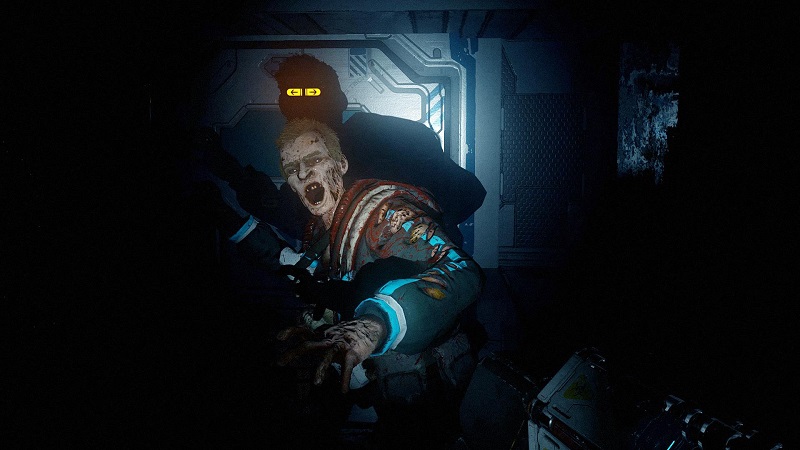
Graphically, The Persistence is one of the very best virtual reality games for visual fidelity, performance and total immersion as it genuinely depicts the atmospheric horror of a spaceship in outer space that has numerous monsters onboard through excellent enemy design and environments that are complimented by amazing lighting, shadows and particle effects. Meanwhile, the procedural generation results in not knowing what is round the next corner from one attempt to complete a deck to another; let alone one playthrough to the next that also plays into the survival horror vibe.
The Persistence’s presentation is immersive as each area of the menus are layered in the sense of what you would anticipate from stereoscopic 3D with menu options in the foreground and the innards of The Persistence spaceship in the background. The highlight of the menus includes the use of PlayStation VR’s gyroscopic motion sensing functionality to look around the inner workings of The Persistence spaceship in amongst a galaxy of stars.
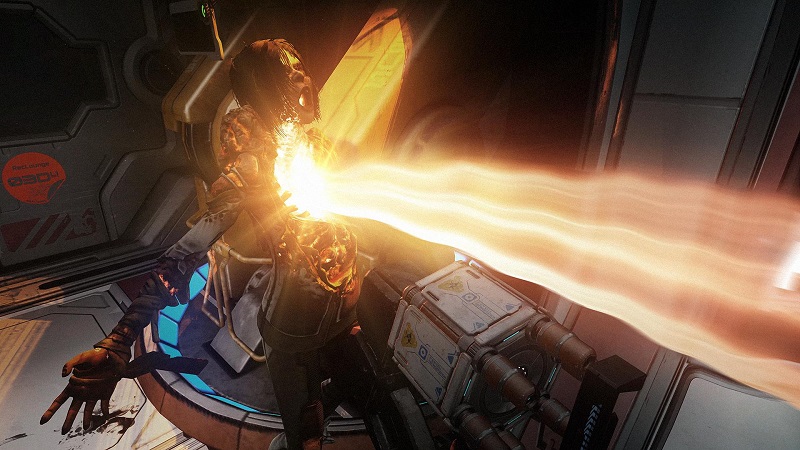
Aneta Piotrowska and Lisa Zahra perform the lead roles as the playable character and The Persistence’s artificial intelligence with both voice-over artists providing an excellent performance that helps to set the audio apart from silent lead characters in the majority of complex virtual reality games. Elsewhere, there is a voice-over that informs the player that the dark matter required to teleport has been depleted and you must wait a few moments before it is available to use again. Sound effects include your character performing stealth takedowns on enemies, enemies attacking your character as soon as they spot her, enemies growling in the distance and ambience that creates a genuine sense of tension; complimented by a fusion of climactic horror and sci-fi stylised music. There are some further nice audio touches such as visual assistance for hearing impaired gamers. There is no DualShock 4 speaker implementation that could have produced voice-overs or atmospheric ambient sound effects.
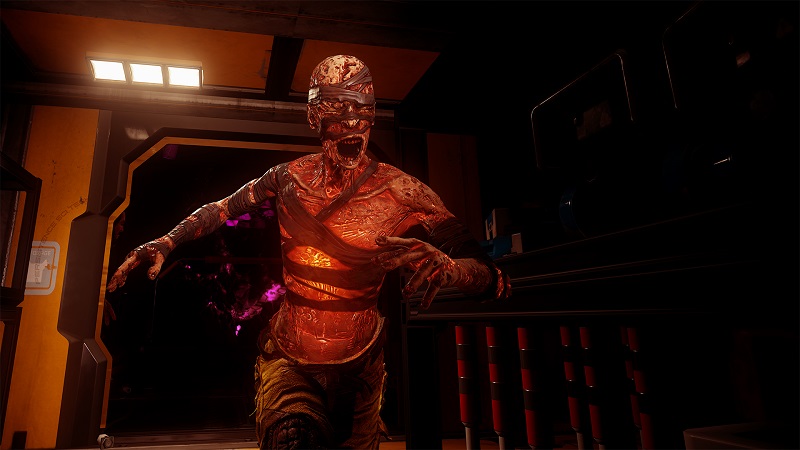
The trophy list includes 44 trophies with 32 bronze trophies, 7 silver trophies, 4 gold trophies and 1 platinum trophy, although no trophies can be earned during assist mode. Easier trophies include the Let’s Do This bronze trophy for entering research deck after the tutorial; the Treasure Hunter bronze trophy for opening 25 supply crates; and the Lock and Load bronze trophy for upgrading a weapon. Harder trophies include the Going Home gold trophy for completing the game and the Everything Is Awesome gold trophy for making an epic of each suit, teleporter, shield, harvester and super sense. It is estimated that depending upon skill and a good trophy guide to provide some helpful tips that it would take between 15 to 25 hours to platinum the trophy list.
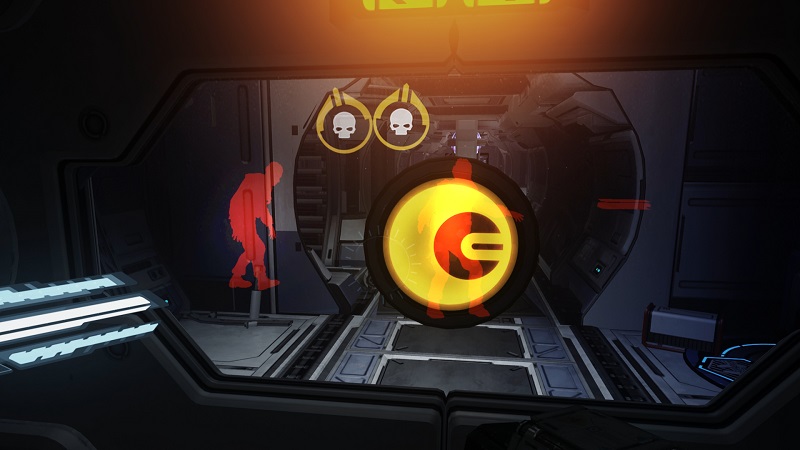
The difficulty curve places an emphasis on stealth as enemies attack your character as soon as they spot her throughout campaign mode. Meanwhile, campaign+ mode features a hardcore difficulty level that significantly elevates the aggression from enemies in comparison to the original campaign. Assist mode can be turned on from the pause menu during gameplay within any mode or playthrough. Assist mode provides a different gameplay experience as assist mode is a collective set of options instead of individually customisable options in order to make The Persistence more accessible to a wider range of gamer’s experience and abilities for when certain areas of gameplay are otherwise too difficult. Assist mode slows down the gameplay; reduces damage inflicted by enemies to increase the chance of survival; infinite teleportation to move quicker without needing to regularly rely on free movement; infinite ammo that reduces how quickly the player would have to aim with their head; every enemy is tagged resulting in enemies that can be seen through walls at all times to reduce any reliance on quick reactions; and an auto shield that automatically deploys the shield to prevent any heavy reliance on fast twitch reactions.
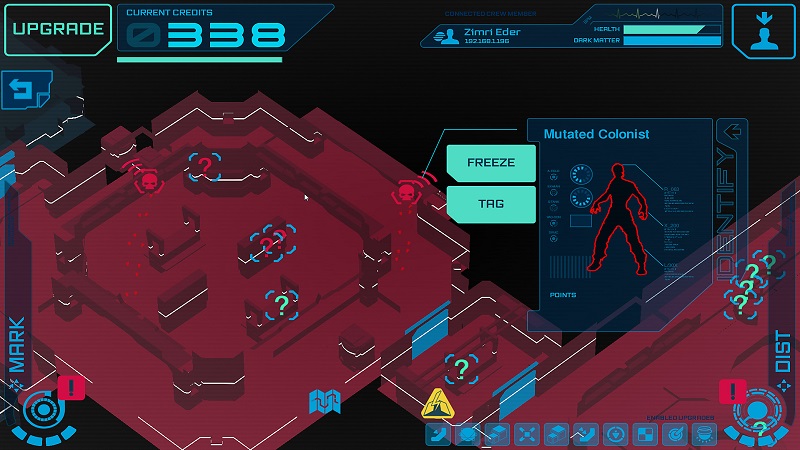
The Persistence’s companion app is available to download for Android and iOS devices with up to 4 friends having the capability of helping the VR player by connecting locally to modify the ship’s engineering system named Solex Systems. Players influence gameplay by utilising abilities to lure enemies, open doors and disable traps. When helping your friends, they can upgrade their Solex system to unlock more powers such as the ability to freeze enemies to help you escape. However, sometimes your friends are given big rewards if your character is defeated which is especially interesting as they have the ability to spawn new enemies and instruct them to attack resulting in the possibility of a co-operative experience becoming a competitive one at barely a moment’s notice. The Persistence’s companion app is a digital art book containing artwork from the game, alongside previously unseen concept artwork.
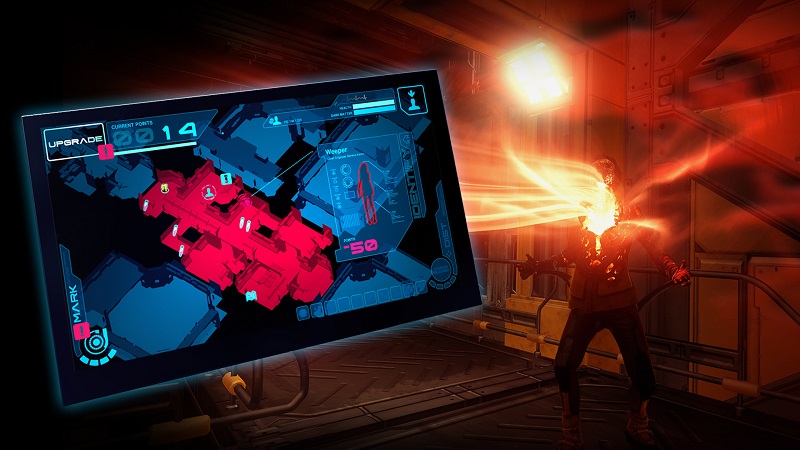
However, it would have been amazing to see the companion app’s second screen functionality also applied to the Vita and within social screen multiplayer for the TV player. A further social screen multiplayer adaptation of the companion app could have seen the TV player controlling each enemy from a first-person perspective to engage in combat against the VR player before the TV player changes to controlling a different enemy when defeated by the VR player in the same way that the VR player would be able to resume in campaign mode through another clone if the character was defeated by an enemy. Both players vie to complete their objectives; the VR player to reach the end of campaign mode and complete every objective in between with the TV player wanting nothing more but to prevent the VR player from doing so.
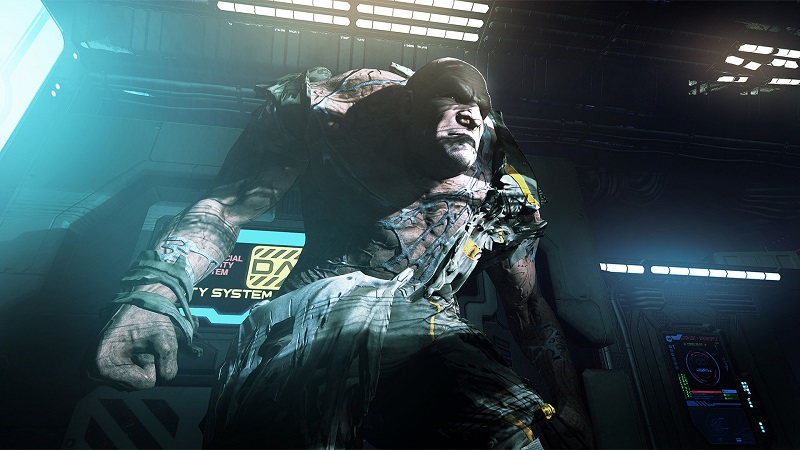
The Persistence’s replayability originates from weapon and ability upgrades, numerous game modes including campaign, campaign+, survival and challenge modes, but most importantly of all is the infinite replay value brought about by procedurally generated environments and local competitive or co-operative multiplayer for up to an additional 4 players via a second screen companion app that will collectively keep players returning for dozens of hours.
Analysis
- Title: The Persistence
- Developer: Firesprite
- Publisher: Firesprite
- System: PlayStation VR
- Format: PS4 Blu-Ray Disc/PSN Download
- Cross-Buy: No
- Cross-Play: No
- Players: 1 (Local Multiplayer for up to a further 4 players through Companion App)
- Hard Drive Space Required: 2.58GB (Version 1.05)
